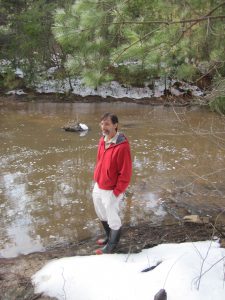Tyler E. Frankel
Assistant Professor of Environmental Science
236 Jepson Science Center
Phone: (540)-654-1424
tfrankel@umw.edu
Ph.D. – University of Maryland – College Park
M.S. – University of Maryland – College Park
Dr. Frankel received his Ph.D. from the University of Maryland – College Park for his research on the impacts of environmental gestagens on the reproduction of the fathead minnow (Pimephales promelas). His general research interests involve the investigation of anthropogenic pollutants on aquatic wildlife, with a specific interest in examining the effects of environmentally relevant pharmaceuticals, pesticides, and industrial wastes on the viability, reproduction, and behavior of both vertebrate and invertebrate species. He is a member of the Society of Environmental Toxicology and Chemistry, and has been published in Chemosphere, Environmental Pollution, Environmental Science and Technology, Environmental Toxicology and Chemistry, and General and Comparative Endocrinology. Techniques utilized in his research include acute and chronic toxicity assays, fecundity assays, oocyte and sperm quality assays, reproductive behavioral assays, and endogenous sex steroid hormone analyses. He is currently serving on the Board of Directors for the Chesapeake Potomac Regional Chapter of the Society of Environmental Toxicology and Chemistry. He has received over $260,000 in external funding from organizations such as the Morris Animal Foundation, FMC Corporation, Crow’s Nest Research Center, Rappahannock EcoPark Support Grant Program, and the JF Environmental Trust Foundation.
Courses: Introduction to Environmental Science; Sources, Fates, and Effects of Toxic Contaminants; Sustainable Aquaculture
Pamela R. Grothe
Assistant Professor of Geology
360 Jepson Science Center
Phone:(540)654-1423
Dr. Grothe’s website: pgrothe.com
Ph.D. – Georgia institute of Technology
M.S. – University of Colorado
Dr. Grothe, who obtained her B.S. in geology at UMW, has a Master’s in geology from the University of Colorado at Boulder and a Ph.D. in Earth and Atmospheric Sciences from the Georgia Institute of Technology, with a minor in higher education. Her research focuses on using the geochemistry from carbonate proxies, such as corals and mollusk shells, to reconstruct the climate over the last several hundred to thousands of years. One of her main research interests is understanding past variability of the El Nino-Southern Oscillation from the mid-Holocene using fossil corals from the central tropical Pacific. Her goal is to understand how ENSO is sensitive to external forcings, such as solar insolation, with possible implications to the greenhouse gas forcing. More locally, she is researching changes in rainfall patterns in the Chesapeake Bay region to better understand how the present-day rainfall patterns are related to natural variability versus human-induced climate change.
Courses: Our Dynamic Earth, Sedimentation and Stratigraphy, Oceanography, Icehouse-Greenhouse Earth, UMW in Bonaire
Jodie L. Hayob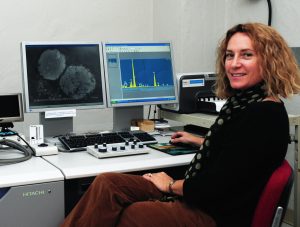
Professor of Geology and Department Chair
jhayob@umw.edu 363 Jepson Science Center Phone: (540) 654-1425M.S., Ph.D. – University of Michigan – Ann Arbor
Hayob’s research interests include igneous and metamorphic petrology, mineralogy, and geochemistry (thermodynamics and phase equilibria). More specifically, she has conducted research on the metamorphism of rocks from the lower crust of central Mexico, the origin and development of microtextures in feldspar minerals, and the metamorphism of Piedmont rocks near Fredericksburg.
Hayob has also conducted high temperature, high pressure experiments with the piston cylinder apparatus at the U.S.Geological Survey in Menlo Park, California. Much of her research has been collaborative with scientists from the U.S.G.S., University of Arizona, and University of South Florida. Most of Hayob’s field work has been done in Canada and Mexico, and more recently in the Appalachians of Virginia.
Courses: Introductory Geology, Evolution of the Earth, Mineralogy, Petrology
Ben Odhiambo Kisila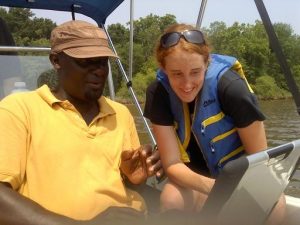
Professor of Geology and Environmental Science
bkisila@umw.edu 362 Jepson Science Center Phone: (540) 654-1107Ph.D. – University of Arkansas
Dr. Kisila’s website: soilwaterresearch.weebly.com/
Kisila is interested in the behavior of contaminants and nutrients in the context of natural aquatic systems; using tools such as hydrochemical water analysis, transient and steady state tracers, particle fluxes and sedimentation rates, multivariate statistics and Geographic Information Systems (GIS). Of particular interest are analyses of surface water site-specific contaminant sources as well as broader contaminant issues associated with long-range atmospheric transport; eutrophication of lakes and reservoirs associated with fluxes of nutrients and increase of productivity in surface waters; watershed geomorphological analysis; use of geophysical methods in sedimentation research such as multifrequency echo-sounding systems to estimate sedimentation rates, sediment thicknesses and stratigraphical sequences in lakes and reservoirs; using isotopes in estimating sediment fluxes and sediment fingerprinting (natural versus anthropogenic); ground water quality and contamination; and the interaction between surface and ground waters, i.e., using major ions and stable isotopes in establishing mixing trends and contamination.
Present research focus includes the following:
1. Bathymetry, geology, sedimentation, and geochemistry of lakes and reservoirs
2. Watershed changes and analysis: impact on water quality in streams, lakes and reservoirs
3. The impacts of dam removals
4. Isotopic analysis of vegetation evolution as a function of both climatic change and human activities.
Courses: Introductory Environmental Science, Evolution of the Earth, Environmental Soil Science, Fluvial Geomorphology
Sarah Morealli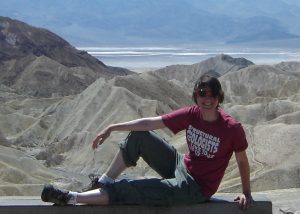
Senior Lecturer in Geology
smoreall@umw.edu 235 Jepson Science Center Phone: (540) 654-1402M.S. University of Pittsburgh
Morelli’s recent research has focused on the formation of breccias and their role in groundwater flow in the Oasis Valley Region of Southwestern Nevada. Since groundwater in the Oasis Valley region flows from Pahute Mesa (where hundreds of underground nuclear bombs were detonated), it is important to understand how the local geology effects the flow of this (possibly contaminated) groundwater. Additionally, breccias related to faulting may provide an expressway, were water can flow quickly from one area to another. The large volume of breccias mapped in Oasis Valley were formed during the Miocene when several intense, extensional “pulses” stretched the crust. My research described and discussed the formation of these breccias, specifically if they were structurally related (directly produced by faulting) and if they could provide a fast-track pathway for the flow of groundwater.
Courses: Introductory Geology, Evolution of the Earth
Melanie Szulczewski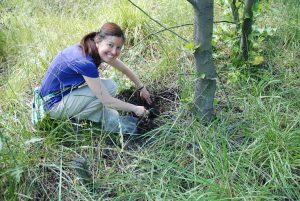
Associate Professor of Environmental Science
mszulcze@umw.edu 361 Jepson Science CenterPhone: (540) 654-2345
M.S., Ph.D. University of Wisconsin – Madison
Szulczewski (pronounced “Scholl-chess-ski”) has investigated contaminated and degraded soils in the mid-West, the Everglades and southern Florida, the Sahel region of Africa, Poland, the Chesapeake Bay watershed, and Jamaica. Szulczewski’s research interests include studying soils and streams contaminated with heavy metals, as well as environments degraded due to excessive nutrients (nitrogen or phosphorus), desertification, and other forms of human interference. With experience in international and local extension work, Szulczewski also examines the effects of human behavior on the environment, both as a cause and potential solution, through sustainability projects and initiatives. She was a Fulbright Scholar in Krakow, Poland, in 2016
Courses: Principles of Environmental Sustainability, Environmental and Ecological Systems, Global Environmental Problems, Pollution Prevention Planning, Environmental Geochemistry, Environmental Regulations, Environmental Exploration, Senior Portfolio and Career Preparation
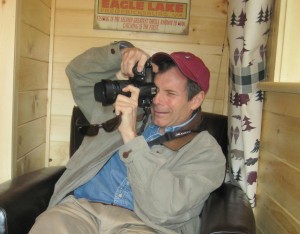 Grant R. Woodwell
Grant R. Woodwell
Professor of Geology
gwoodwel@umw.edu 237 Jepson Science Center Phone: (540) 654-1427M.Phil., Ph.D. – Yale University
Woodwell has engaged in field work in the Canadian and American Rocky Mountains, the Appalachians and the Spanish and French Pyrenees. Prior to his appointment at Mary Washington College, Woodwell was a researcher at London University studying hydrocarbon migration in northern Spain in cooperation with Hispanoil petroleum company. While still at Yale University Woodwell did postdoctoral research into the subject of nuclear waste disposal for the Oakridge National Laboratory in Tennessee. Woodwell’s research interests encompass structural geology and stable isotope geochemistry. Specific research has included studying the sources, composition and movement of fluids in the Earth’s crust, the effect of fluids on rock deformation and faulting, and understanding microscale deformation mechanisms and their associated rock fabrics. He has also been active in using computers to display spatial data and multidimensional geophysical data sets.
Courses: Computer Methods in Environmental Science and Geology, Structural Geology, Plate Tectonics
John Tippett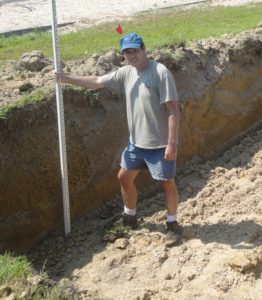
Adjunct Professor
231 Jepson Science Center
M.S. – Duke University
Tippett is the former executive director of Friends of the Rappahannock, where he led successful community initiatives to preserve riparian land, restore anadromous fish passage, and reform storm-water pollution regulations.
His previous work in the private sector includes the development of watershed models to support nutrient trading in North Carolina’s Tar-Pamlico Basin and cost-effectiveness analysis of agricultural BMPs for pollutant reduction. He has worked internationally for USAID, which included the development of pollution management software for the Danube Basin and the training of NGO watershed organizations in the Philippines.
His current research focuses on the effectiveness of Low Impact Development (LID) practices for reducing pollutant loads in urbanizing watersheds.
Courses: Introduction to Environmental Science I and II, Global Environmental Problems, Environmental Science Seminar, Energy Resources & Technology
Emeritus
Charles E. Whipkey
(pictured at right)
Associate Professor Emeritus of Environmental Science and Geology
Ph.D. – University of Pittsburgh
Michael L. Bass
(pictured at right)
Professor Emeritus of Environmental Science and Biology
Ph.D. – Virginia Polytechnic Institute and State University
Robert L. McConnell
Professor Emeritus of Geology
Ph.D. – University of California, Santa Barbara
_____________________________________________________________________________________________
In Memoriam
Neil E. Tibert (1966 – 2015)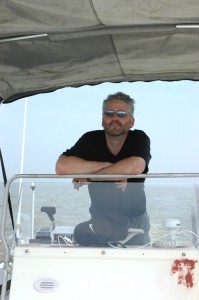
Our colleague and good friend Neil Tibert passed away in 2015 after a brief illness. Neil’s wit and intelligence provided a spark to our department and the entire UMW community. Neil was truly one of a kind and irreplaceable.
A newly described Cretaceous fossil turtle was recently named Paiutemys tibert, by Walter Joyce, Tyler Lyson, and James Kirkland, “in recognition of the late Neil E. Tibert, who was instrumental in establishing the stratigraphy of mid-Cretaceous beds in the type locality of the new taxon.” See the article at https://peerj.com/articles/2502/.
